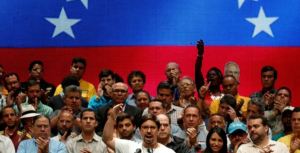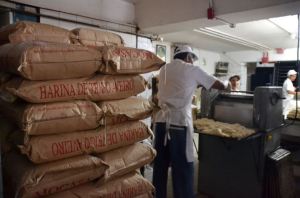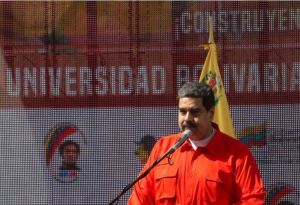nsnbc : Venezuela’s Roundtable of Democratic Unity (MUD) coalition called for the first national strike since the 2002 strike that failed to oust President Nicolas Maduro’s predecessor, Hugo Chavez. Ironically, the strike is among others prompted by Maduro’s and the socialist Party (PSUV) administration’s attempt to rewrite the 1999 Constitution adopted under Chavez.
 A 24-hour national strike is set to begin at 6.a.m. local time as an expression of national disapproval of President Nicolas Maduro’s and the PSUV’s plan to convene a Constituent Assembly that would be tasked with drafting a new Constitution. Maduro and the PSUV maintain the new Constitution is necessary to “consolidate the achievements of the Bolivarian revolution”.
A 24-hour national strike is set to begin at 6.a.m. local time as an expression of national disapproval of President Nicolas Maduro’s and the PSUV’s plan to convene a Constituent Assembly that would be tasked with drafting a new Constitution. Maduro and the PSUV maintain the new Constitution is necessary to “consolidate the achievements of the Bolivarian revolution”.
Others, including the MUD, denounce the plan as an attempted constitutional coup. The MUD announced that it will be boycotting a July 30 election to select members of the Constituent Assembly.
Fedecamarcas, Venezuela’s largest business group, carefully avoided an overt endorsement of the strike. Its members have told employees that “they won’t be punished for coming to work”. The group played an important role in the months-long 2002-2003 strike that opponents of Hugo Chavez as well as the private business sector orchestrated in an attempt to topple him.
 Chavez emerged from the 2002 strike and exerted control over much of the private sector with a policy of expropriations, strict and suffocating regulations, and imports as well as well as a number of “social projects”, financed by oil export revenue that improved living conditions for many of the most impoverished.
Chavez emerged from the 2002 strike and exerted control over much of the private sector with a policy of expropriations, strict and suffocating regulations, and imports as well as well as a number of “social projects”, financed by oil export revenue that improved living conditions for many of the most impoverished.
The backside of that medal was that these projects, especially since Maduro inherited the presidency, aimed at least as much at “consolidating PSUV control over all aspects of civil society” as they aimed to mitigate poverty and enhance social justice.
Moreover, regulations also affected many small, family businesses like bakeries. Many had had to either close or make themselves subject to party-control. An estimated 150,000 businesses or more have been closed down over the last 15 years.
Administration threatens to punish private industries

A “ruthless economic war against Venezuela” and “misuse of subsidized flour”, or a “heavy-handed response to bakeries’ coping with a failed Soviet-style economic model”? Depends on whom you are asking. Photo courtesy SUNDDE
Government / State – run industries will remain open and Labor Minister Nestor Ovalles said the administration would punish private companies that close in sympathy with the strike. Ovallas commented on the strike and said:
“We won’t allow, and we’ll be closely watching, any disruption that violates the working class’s right to work. … Businesses that join the strike will be punished.”
Fedecamarcas incoming president, economist Carlos Larrazabal, said the strike would be of limited duration to avoid worsening Venezuela’s already dire shortages of food and other basic products.
“Inventory levels right now are very precarious,” Larrazabal said. “If the supply chains are affected more than they are right now, we could have a bigger problem.”
Worker’s Confederation joins strike
Venezuela’s Workers’ Confederation, a labor coalition with ties to the MUD, said at least 12 of its 20 member organizations across the country had decided to join the strike.
Transportation workers in the capital, Caracas, also said they would participate. “There’s an appeal to the conscience of the Venezuelan people,” said Pedro Jimenez, head of a major transport workers’ union. “There won’t be transportation services.”
More than 24 hours before the start of the strike, neighborhood groups across Caracas were setting up roadblocks of tree branches and tires to protest Maduro’s and the PSUV’s plans to change the constitution, irritating some residents.
“The government jails the people who protest and those who are protesting are caging the rest of us. It’s unfair,” said Maria Sandoval, a 27-year-old medical secretary.
Those who are manning the roadblocks, however, said they had no plans to stop until Maduro fell, complicating the scenario for Wednesday. Protester Ester de Moreno said:
“We have been blocking the streets since yesterday and we will do it all week. … “We will continue doing this until this man leaves.”
Many of the protesting members of the public, including many who traditionally support the PSUV, fear that the rewriting of the Constitution adopted under the late Hugo Chavez in 1999 substitute the achievements of the “Bolivarian revolution” with a one-party tyranny, instead of consolidating those democratic achievements that actually were beneficial for the people.

President Maduro obsessing about the presence of “traitors” everywhere”. It’s not a coup, when we do it it’s called a revolution? (Prensa Presidencial)
15 years after the 2002 National Strike, the socialist PSUV controls vast swathes of the Venezuelan economy, making it ever harder for the private sector to contribute to halting the country’s economic decline.
It is this decline, that affects much of the economy, hamstrung by a plunge in oil prices and years of corruption and mismanagement, that eases the task of the MUD in calling on a national strike despite the fact that the PSUV-dominated Supreme Court has suspended the legislative branch of government where the MUD holds an absolute majority.
Also easing the MUD’s job is the fact that a growing number of Venezuelans, including those who traditionally supported the PSUV, see that the party is consolidating undue and dangerous influence over the country’s security and intelligence services, prison systems, and all aspect of civil society in a Soviet-style approach.
Many of the Socialist, Communist, Trozkyist, Syndicalist and Anarchist grassroots organizations and parties that traditionally supported the PSUV have long withdrawn their support.
CH/L – nsnbc 20.07.2017
Source Article from https://nsnbc.me/2017/07/20/venezuelas-mud-and-wokers-confederation-call-for-first-national-strike-since-2002/
 RSS Feed
RSS Feed















 July 20th, 2017
July 20th, 2017  Awake Goy
Awake Goy 










 Posted in
Posted in  Tags:
Tags: 













